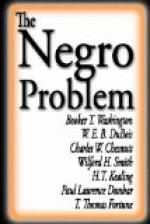It will take the Afro-American people fully a century to recover what they lost of civil and political equality under the law in the Southern States, as a result of the re-actionary and bloody movement begun in the Reconstruction period by the Southern whites, and culminating in 1877,—the excesses of the Reconstruction governments, about which so much is said to the discredit of the Negro, being chargeable to the weakness and corruption of Northern carpet-baggers, who were the master and responsible spirits of the time and the situation, rather than to the weakness, the ignorance and venality of their Negro dupes, who, very naturally, followed where they led, as any other grateful people would have done. For, were not these same Northern carpet-baggers the direct representatives of the Government and the Army which crushed the slave power and broke the shackles of the slave? Even so. The Northern carpet-baggers planned and got the plunder, and have it; the Negro got the credit and the odium, and have them yet. It often happens that way in history, that the innocent dupes are made to suffer for the misdeeds and crimes of the guilty.
The recovery of civil and political rights under the Constitution, as “denied or abridged” by the constitutions of the States, more especially those of the old slave holding ones, will be a slow and tedious process, and will come to the individual rather than to the race, as the reward of character and thrift; because, for reasons already stated, it will hardly be possible in the future, as it has not been in the past, to unify the mass of the Afro-American people, in thought and conduct, for a proper contention in the courts and at the ballot-box and in the education of public opinion, to accomplish this purpose. Perhaps there is no other instance in history where everything depended so largely upon the individual, and so little upon the mass of his race, for that development in the religious and civic virtues which makes more surely for an honorable status in any citizenship than constitutions or legislative enactments built upon them.
But even from this point of view, I am disposed to believe that the Negro’s civil and political rights are more firmly fixed in law and public opinion than was true at the close of the Reconstruction period, when everything relating to him was unsettled and confused, based in legislative guarantees, subject to approval or disapproval of the dominant public opinion of the several States, and that he will gradually work out his own salvation under the Constitution,—such




